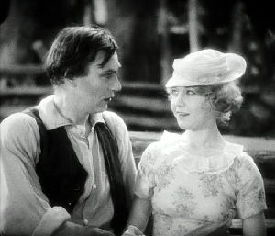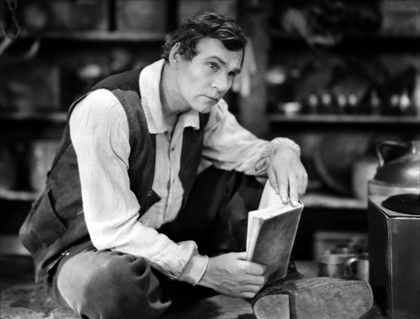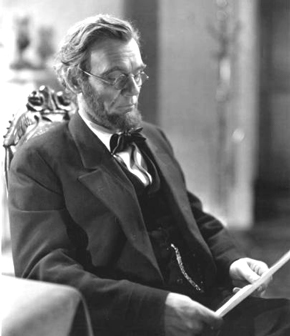
 |
|
|
|
D.W. Griffith's career decline is often held up as prime evidence of Hollywood's cruel treatment of its own pioneers. After leading the industry to artistic respect and making one of the most popular films of all time, Griffith lost his edge in the 1920s. The founding partner of United Artists continued making pictures that didn't click with audiences. One of the best remembered is his first sound production, 1930's Abraham Lincoln. Surely released on Blu-ray at this time to catch the wave of interest generated by Spielberg's new Lincoln picture, Griffith's picture comes off as an interesting curio. Its earnest simplicity seems more dated than ever, despite the fine performance of Walter Huston in the lead role. 
The 16th President is presented in old-fashioned schoolbook terms, starting and ending with visuals representing the log cabin where he was born. The folksy, well-liked Abe Lincoln (Walter Huston) is shown working in a hardware store, wooing the adorable Ann Rutledge (Una Merkel) and suffering for weeks after her untimely death. Back in the swing of things, he gains political offices, marries Mary Todd (Kay Hammond) and spars in debates with Stephen Douglas (E. Alan Warren). The war years take their toll as he is forced to assume direct command of the Union Army. Finally, we see the conspiracy at Surrat's boarding house, where actor John Wilkes Booth (Ian Keith) determines to rid the country of a man he considers a tyrant. Abraham Lincoln is a serious, by-the-numbers bio that touches on but a few high points in the great man's life, and those only superficially. It assumes an audience already in awe of Lincoln, as if he were the subject of a Biblical epic. The sound format doesn't do Griffith any favors as a director. Many scenes are taken from one angle, and although the sound work is fairly good the show seems even more static than some of Griffith's great silent pictures. Although much of his makeup is very good, an early scene with Una Merkel shows Huston wearing a bad choice of lipstick and eyeliner -- he looks almost like a female impersonator (see above). Given the constraint that everyone talks too slowly, with an unnatural stage delivery, Huston brings a charm to Abe, trying to convey the man's purported cracker barrel sense of humor. A very good moment sees the sheriff repossessing young Abe's horse and saddle right on the road, for non-payment. The humor comes when Lincoln not only gives in, but jokes with the Sheriff about the situation. It's apparently difficult to hang onto personal property during hard times in the Illinois back woods. The show gets a boost from a couple of well-staged visits to the front during the War, and a bit of a battle. We see Lincoln intervening for leniency in the summary death sentence handed to a soldier accused of cowardice and desertion (James Eagles). Told that the Rebs might overrun the Capitol and take the White House, the First Lady is incensed over the she's still acting inconvenience. Toward the end Lincoln doesn't know if he's dreaming of four more years of good political work, or just hoping that he'll be able to retire and try to mend his frayed personal life. For the second time in his career Griffith stages the assassination at the Ford Theater ... less accurately than he did in the 1915 Birth of a Nation. Booth doesn't seem to break his leg leaping to the stage from the VIP box. 
Abe Lincoln isn't one of Walter Huston's great performances, as Griffith seems intimidated by the requirements of sound. Yet Huston is still enjoyable in the role and his bearded makeup is a decent match for the Chief Executive. Una Merkel is seen in little more than a single two-shot flirting with Abe and his awkward overtures of romance; she's especially touching in the role because we're so aware of her later great performances. Kay Hammond is less interesting as Lincoln's wife, with her many personal problems left unexplored. Griffith is determined to applaud Lincoln, not reveal his domestic tragedies. The film treats the President at all times with awestruck respect, and Huston only infrequently gets to make Abe seem a fully-fleshed character. The famed William Cameron Menzies designed the movie's sets, but what stands out most strongly are some so-so miniature landscapes and a model of Abe's legendary log cabin. The camerawork on the whole seems primitive for 1930, and with little of the charm of Griffith's earlier classics, that took strength from their own quaintness and formality -- the cutaways to iris shots, the poetic inter-titles, etc. Making the show more attractive for collectors is the fact that it is the Museum of Modern Art's version from 2008, which restores several early scenes trimmed after the first release. As the accompanying sound has gone missing, these four or so minutes are shown silent with subtitles. The most interesting is a prologue aboard a slave ship packed with unfortunate Africans being shipped to America. The captain discusses how many have died, and we see a body tossed overboard. Was the scene deleted so as to not offend Southern exhibitors? 
That sensitivity is undercut by a later scene, in which a black man reciting lines of dialogue is played by a white actor in blackface. Griffith may be lauding the Great Emancipator but he himself is far from enlightened. Kino Classics' Blu-ray of Abraham Lincoln is a quality encoding of this aged picture, considered a classic because its director is Griffith. The picture is no beauty and the sound is still a bit rough, but it is a 1000% improvement over the battered, over-duplicated prints we saw in film school. The couple of recovered (silent) scenes smooth out what was previously a very rough opening. Kino's extra is an eye-opener that does little to improve Griffith's reputation as a traditional Southerner holding on to 19th-century values. Birth of a Nation was reissued around the time of Abraham Lincoln, and Griffith filmed a pair of introductions for it. Sitting in a comfortable smoking room, the director answers Walter Huston's questions with the slow cadence of a gentlemanly elder statesman. The promotional talk is also meant to quell the controversy over the unrepentantly racist silent classic, which in its time ignited anti-black riots and gave an enormous boost to the Ku Klux Klan. Griffith at least has the courage of his prejudices - he still talks as if the main problem with the Reconstruction Era was the presence of tyrannical black office holders in state legislatures, putting Southern whites on the defensive. He finally says it straight: "The Klan at that time was needed and served a purpose." Kino's disc producer is Bret Wood.
On a scale of Excellent, Good, Fair, and Poor,
Abraham Lincoln Blu-ray rates:
Reviews on the Savant main site have additional credits information and are often updated and annotated with reader input and graphics. Also, don't forget the 2011 Savant Wish List. T'was Ever Thus.
Review Staff | About DVD Talk | Newsletter Subscribe | Join DVD Talk Forum |
| ||||||||||||||||||